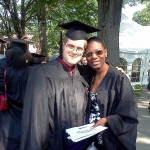 Stefan Ward-Wheten graduated from Williams in June of 2011 with degrees in Comparative Literature and Political Science. While at Williams, he was invited to present a paper at the 2011 American Comparative Literature Association. Below follows his account of the experience in working on his paper, “Accessing the Real Through Ethical Translation: A Multicultural Analysis of Ancient Chinese Poetry.” Stefan is currently based in Northampton, Massachusetts, working in outreach and fundraising for several political advocacy campaigns while pursuing his interests in freelance and professional writing and editing, education, communications, and nonprofit development.
Stefan Ward-Wheten graduated from Williams in June of 2011 with degrees in Comparative Literature and Political Science. While at Williams, he was invited to present a paper at the 2011 American Comparative Literature Association. Below follows his account of the experience in working on his paper, “Accessing the Real Through Ethical Translation: A Multicultural Analysis of Ancient Chinese Poetry.” Stefan is currently based in Northampton, Massachusetts, working in outreach and fundraising for several political advocacy campaigns while pursuing his interests in freelance and professional writing and editing, education, communications, and nonprofit development.
Abstract for Accessing the Real Through Ethical Translation: A Multicultural Analysis of Ancient Chinese Poetry:
More than ever, new developments in prose and verse are entering into a worldwide conversation of ideas. In an increasingly globalized literary landscape, how should meaning be understood and drawn from these works as one encounters them – often in a very different context from their origin? This essay takes a comparative approach to that question, juxtaposing a piece from the eighth-century Chinese poet Wang Wei with two literary critics of the modern era, Jacques Lacan and Julia Kristeva. The poem is analyzed both in translation and in a more direct reconstitution of the original Chinese; each version invites a distinct interpretation from these Western theorists. Here the feat of translation is examined for its potential as a tool of exegesis as well as of proliferation, introducing new possibilities of reading by reformulating the work in different linguistic frames. Rather than simply acting as an atrophic filter against the full import of meaning, the movement across cultural and linguistic contexts in fact creates a dialectic between various manifestations of the work that provides a fuller understanding of the work’s own dimensions. Given the growing diversity of the universe of letters, “ethical translation” offers a means of furthering cross-cultural encounter while maintaining a constructive approach to the interplay of language and of worlds along the way. → More (PDF)